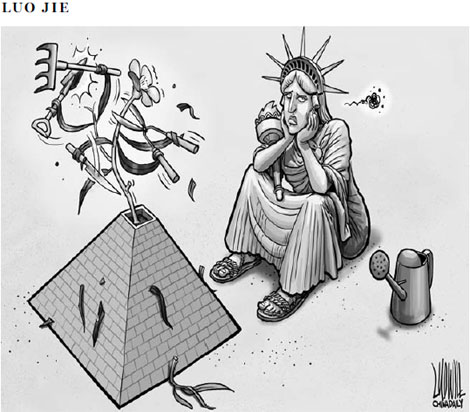Fallout of Snowden expose
- By Fu Mengzi
 0 Comment(s)
0 Comment(s) Print
Print E-mail China Daily, July 13, 2013
E-mail China Daily, July 13, 2013

Former CIA agent and National Security Agency operative Edward Snowden left Hong Kong about three weeks ago, but the world's attention is still on the man who exposed the US' global surveillance program. The flight of Snowden from Hong Kong to Moscow sparked a war of words between the US and China, with the US State Department warning that the incident could harm bilateral relations.
The possible fallout of the Snowden incident, however, is yet to be assessed. To do that, we have to focus on two aspects: PRISM, the program which Snowden exposed, and Hong Kong authorities' permission to Snowden to leave the city.
To begin with, the PRISM expos is likely to change the nature of China-US dialogue.
There is still no shortage of people in the US who believe the current China-US problem pertains neither to security nor strategy, but to cyber issues - Chinese cyberattacks against the US, to be precise. That is hardly surprising, because before Snowden exposed the surveillance program the US portrayed itself as a victim of cyberattacks, accusing the Chinese government and companies of hacking into American computers. The US ignored China's refutations, and even made cyberattacks a part of the agenda of the meeting between President Xi Jinping and his US counterpart Barack Obama in Sunnylands, California.
But "the Snowden evidence" has reversed the situation by establishing that China is a victim of cyberattacks. So now China should change its passive posture - which it maintained earlier in the wake of US accusations - and be confident enough to ask Washington to abandon its surveillance program and strengthen its cybersecurity cooperation with Beijing.
The Snowden incident also has marred the US' image across the world, especially in China. Chinese people have mixed feelings toward the US. On one hand, they detest America's past hostility toward China and hate its hegemonic attitude. On the other, many Chinese see the US as a country which believes in the principle that "all men are created equal"and "personal freedom is not to be violated".
Not surprisingly, the US government has used this principle to occupy a high moral ground in international relations. But the disclosure of a deep-rooted, extensive mass surveillance program has exposed American hypocrisy. The US never had - and will never have - the right to demand that other countries obey or endorse its domestic laws.
The US, along with the rest of world, will now have to adapt to the changed situation. That the US has been spying on China is neither surprising nor strange. What is baffling, though, is that it has also been snooping into the internal affairs of its allies such as European countries and Japan. How could US allies not feel wronged?






Go to Forum >>0 Comment(s)